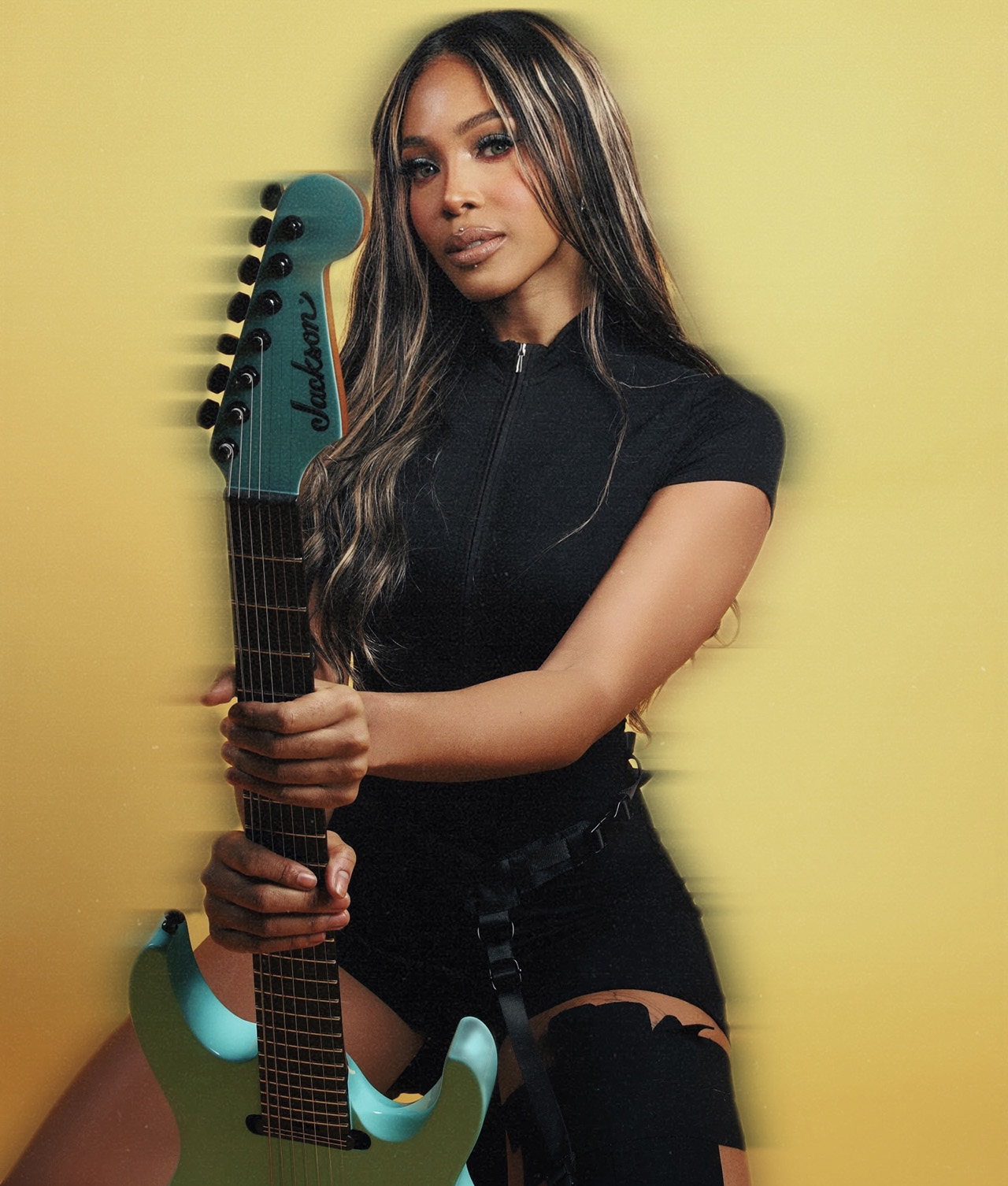
Chena’s riff-writing skills were put to the ultimate test in Musician Mansion, constructing songs in a few hours with people she’d just met. Needless to say, she came prepared, and rose to the occasion.
What she brought to a room full of seasoned shredders were Plini-style riffs, melodic cascading runs, and an out-of-the-box attitude merged with a less-is-more mindset – taking after guitar heroes such as Marty Friedman.
She’s often deemed a metal guitarist, but she notes: “I love dark synth, too. I’m bringing a lot of those elements to my music.” Experimenting with instrumentation is key. “I’ve always been like that, I like to explore different styles.”
What initially drew you to the guitar?
“When I was around 12, I delved into alternative music such as Bullet For My Valentine. I wanted to write my own songs – I needed to be able to express myself musically and found solely singing to be limiting. I thought, ‘I should play, so I can perform my own songs and not have to depend on other people.’
“Guitar was the most accessible, and way more practical than getting a drum set or grand piano. I wanted to rock out and be as cool as my heroes. At times I wish I had learned piano first, though – it really does help with an understanding of guitar. I didn’t take the academic route. I was figuring it out, and I’m still figuring it out.”
You’ve been seen with a Strandberg, Jackson, and Schecter in your hands. Tell us about some of your go-to guitars.
“My main guitar is a Jackson Josh Smith Soloist 7-string. It's a great baritone, fitted with an Evertune bridge, ebony neck, bare-knuckle impulse pickups with a humbucker in the bridge and single coil in the neck. It's quite versatile – I use it for recording a lot, both for heavy sounds and clean bright tones.
“I have three of them set up in different tunings to simplify my life. I have other Jackson models as well, all 7-strings. I also started playing more Strandbergs. I love the lightweight headless modern design and tone of them, too.
“I'm quite simple when it comes to gear. When I find something I like and it works well for me, I stick with it. I use a Neural DSP Quad Cortex to simplify everything. I have different presets for recording and live performances, where I just go straight to FOH with it.”
You’re not shy about dropping the occasional solo. What’s the point of a good solo for you?
“I love tasteful solos. Before I launched my debut project as a vocalist, the guitar solo was my voice. It is a way to express without having to sing. I love melodic and comprehensible solos you can hum along to. My purpose is to have that second voice, using some notes that are harder to reach with my contralto voice.”
What about the lead guitar work on your Prisoner of Conformity single?
“The song encapsulates who I am as an artist. I think for myself and don’t care whether I fit in. It’s an anthem about forging your path in life and making conscious decisions about who you want to be. I have a message in every song I write – there’s no better time to make socially and politically charged music.
You must get on quickly, find commonalities and play on each other’s strengths, leaving egos at the door
“I wouldn’t say the demo sounds completely different, but it had a lot more going on in terms of riffs. I started off with just riffs. Then the drums were reprogrammed and I rewrote the riffs to those drums. I think it really enhanced the song.”
Away from your solo work, you were a part of Musician Mansion, the ‘instant band’ documentary experience led by Jared Dines. What was it like?
“Exhilarating, challenging, and fun. It tested what we were made of. It’s hard to create cool songs with musicians you just met. You must get on quickly, find commonalities, and play off each other’s strengths, leaving egos at the door. The band I was in, Soulfire, did just that. It felt like a boot camp – I think everyone left a better musician.”

Was there any bickering, or anything you all had to work through?
“Not at all. Everyone was so talented but also humble. No one was condescending; we just wanted to see everyone do well and have fun. The time limits also forced us to put creative differences aside and do what was best for the band and the challenge at hand.
“Many of us did have similar tastes, though, which surely helped in our professional chemistry. It was easy to bond over everything we went through during filming and after.”
Dissecting Eric Johnson’s cascading pentatonic runs is so cool – he makes it sound so fluid
Who are your biggest guitar inspirations?
“There are a few that I keep coming back to. Marty Friedman’s phrasing is so unique to him, and the way he approaches soloing is very out-of-the-box. It’s cool when a guitarist figures out a certain sound or style, then you hear them play and you don’t have to see them to know it’s them.
“Melodic players I admire include Per Nilsson, Mikael Akerfeldt, Plini, Petrucci, and Sam Vallen. I keep coming back to Eric Johnson, too. Dissecting his cascading pentatonic runs is so cool – he makes it sound so fluid. Nili Brosh and Nita Strauss are also awesome. It’s inspiring to see women absolutely killing it.”
What more can your listeners expect from Chena this year?
“My solo projects are going strong! I did an album with a band I’ve been playing with for a few years now called Catalyst Crime. Soulfire, the band I joined at Musician Mansion, will have an EP out shortly. Drums and vocals are done, so it’s just on to bass and mixing now.”
- Prisoner of Conformity is available now.







